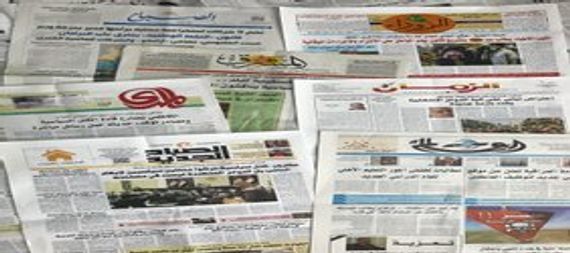Baghdad / Nina Newspapers published in Baghdad today, Monday, the nineteenth of February, focused on the reality of services in Iraq and the political obstacles facing the new local governments.
Al-Zawraa newspaper, which is issued by the Iraqi Journalists Syndicate, focused on the issue of services in Iraq and ways to improve their reality.
A member of the Parliamentary Services Committee, Adnan Al-Juhaishi, said in an interview with the newspaper: “Our problem in Iraq is the lack of integrated strategic plans. Creating housing units, such as ten thousand units, requires streets in order to balance the road issue, in addition to how many schools, how many kindergartens, and universities.” “You need, as well as hospitals and dispensaries.”
He added: “We are working to solve a specific problem or crisis and develop a plan for it, but we run into other problems… so we have to develop big strategic plans.”
Al-Juhaishi explained: “The capital, Baghdad, has become very crowded, and we see the plans that have been drawn up to reduce the momentum within it, including the metro, which was signed by the Prime Minister. We have alternatives. Our lands are large, wide, and straight, and we must move away from the capital, Baghdad, and build cities, departments, and ministries. Even our ministries were established in the seventies and eighties.”NinaThe circles in general are old, dating back forty or fifty years ago.”
He continued: “We have to deal with what is inside Baghdad based on the reality of the existing situation, but any further expansion must be outside the capital, and it is possible to build civilized cities and build a government city or an administrative capital similar to what Egypt is doing.”
A member of the Services Committee called for bringing in foreign expertise and seeking the help of foreign companies to address the issue of momentum and stopping investments inside the capital and making them outside it, indicating: “Responsible companies save us time first and quality second, as evidenced by the fact that we have spent billions over the past twenty years and some Iraqi companies are lagging behind, but there is goodness ahead of us.” For example, north of Baghdad, every distance of thirty kilometers requires two hours of time to overcome the crowding, as the entrances to Baghdad are defective.”
As for Al-Sabah newspaper, which is published by the Iraqi Media Network, it focused on the issue of political obstacles facing the new local governments.
The newspaper said: “Local governments in the governorates are facing political obstacles, and their delay may lead to a loss of confidence in the upcoming legislative elections, as two out of 15 governorates are facing political obstacles (Diyala and Kirkuk), while legal obstacles have hindered the appointment of another governor (Salah al-Din).”
She added: “The legislative elections are scheduled to be held in the last quarter of next year, after the local elections recorded a decline in the number of participants in the elections that took place in mid-December, after the disruption of the governorate councils in 2019.”
The Vice Chairman of the Parliamentary Regions and Governorates Committee, Jawad Al-Yasari, warned of the existence of problems in the provinces of Diyala and Kirkuk, warning that the service situation would be affected by partisan conflicts over positions.
The leftist said, in a statement to Al-Sabah: “The political problems in some governorates will affect the service aspect and stability there.”
He added: “Administrative work continues in these governorates because the deputy governors are the ones running them,” warning that “political disputes will disrupt public interests, which will negatively affect the service reality, while we need to restore citizen confidence in the electoral process.”
He continued: “The situation in Kirkuk Governorate is special because it must be managed by all components,” and pointed out that there is “fear of the position of governor who controls the administrative, economic, and security aspects of the governorate.”
Al-Sabah quoted former Baghdad Provincial Council member, Majid Al-Saadi, as saying: “The distribution of positions in the provincial councils affects the provision of services.”
He added, “Electoral alliances are unreal because they distribute positions far from the actual needs of the citizen.”
In a related matter, Al-Zaman newspaper referred to the protest against some neoconservatives.
The newspaper said: “Dozens of demonstrators came out in Babylon to protest the new governor assuming his position, and during the protest they refused to appoint the new governor.”
On the other hand, Al-Zaman referred to a “secret document leaked from the Presidency of the Republic” explaining the reason that prompted the president to refuse to appoint Ahmed Al-Jubouri as governor of Salah al-Din.
The document stated, according to the newspaper: “Al-Jubouri has been convicted of criminal cases and has been included in the general amnesty, and others are sponsored for them, in addition to the presence of criminal restrictions against him in the Ministry of Interior.”
She added: “The president was unable to issue a presidential decree appointing Al-Jubouri as governor of Salah al-Din, stressing that his election was in violation of the law on provincial and district council elections and the law on irregular governorates, as amended.”
The document indicated that the Presidency of the Republic directed that nominations be opened again and that another person be elected for the position of governor, who meets the nomination conditions stipulated in the law./ End
To receive more news, subscribe to our channel on Telegram


